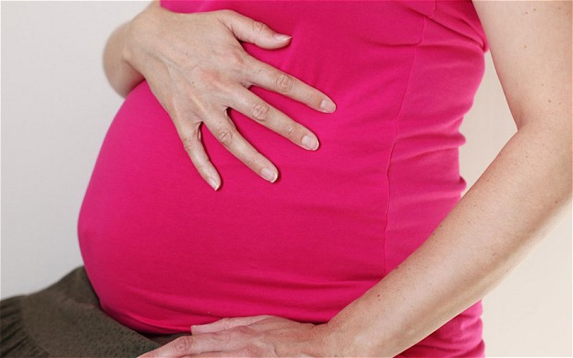
Scientists have found that very high levels of stress in the mother can also overwhelm the barrier enzyme in the placenta, allowing the stress hormone cortisol to cross into the foetus’s brain. Photo: PA
Researchers have discovered a key component of the placenta that normally protects unborn babies from high levels of hormones that build up in their mothers’ blood when she is stressed.
In some mothers, however, this protective element can be faulty, allowing the foetus to be exposed to stress hormones and leaving a child more prone to anxiety and depression in later life.
The scientists have found that eating large amounts of liquorice, which is a common craving for pregnant women, can also deactivate the barrier that protects the foetus from the mother’s stress.
The findings may help to explain why some children grow up less able to deal with stress and anxiety than others.
It could also explain why among soldiers, some will develop post traumatic stress disorder after being caught in a bomb blast while others will remain unaffected.
Professor Jonathan Seckl, an endocrinologist at the Queen’s Medical Research Institute at the University of Edinburgh who has been conducting the work, said: “There is an enzyme found in high levels in the placenta and the baby’s brain.
"It seems to be a natural barrier to stress hormones as it deactivates them.
“If you inhibit this barrier then you start to get children being born with low birth weight and who have altered stress responses and depression. This may be what underpins the variation you get from one individual to another.”
Professor Seckl and colleagues at the Weizmann Institute of Science in Israel believe a breakdown in the protective enzyme, allows high levels of a stress hormone called cortisol that builds up in the mother’s blood when she is under stress to cross into the foetus’s brain, where it can trigger something known as developmental programming.
This is causes genes to be switched on or off and can determine how they work through a child’s life. In our evolutionary history this would have helped prepare a mother’s offspring for the outside world.
However, in the modern world it appears to lead to conditions such as depression, attention deficit hyperactivity disorder (ADHD) and leave children more anxious.
Studies by Professor Seckl have shown that rats who were fed liquorice, which contains a potent inhibitor of the barrier enzyme, have shown that they tend to have offspring that are more prone to anxious behaviour.
Similarly, mice that were born without the genes for the protective enzyme also had offspring that were more prone to hyperactive and anxious behaviour, particularly if they had been stressed during pregnancy.
Professor Seckl added: “When we looked at Finish women, who tend to eat a lot of liquorice, those who ate a bag a day compared to those who did not eat liquorice tended to have babies born a couple of days earlier.
“By the age of eight, however, we saw a two third increase in the rates of attention deficits and anxiety behaviours.”Scientists have also found that very high levels of stress in the mother can also overwhelm the barrier enzyme in the placenta, while in some women they may not produce enough of the enzyme in the first place.
Studies of children who were in the womb during the 9/11 terrorism attacks in New York have also shown that if mothers are exposed to stress in the third trimester their babies tend to have altered stress responses and altered behaviour.
Professor Alon Chen, a neurobiology at the Weizmann Institute who is working with Professor Seckl on a joint UK and Israeli project, suggested that exposure to stress in the later stages of pregnancy appears to be the most crucial.
Professor Chen said: “Late gestation is a very sensitive window. If you expose animal models to stress in the second trimester then you get 16% of the offspring showing susceptibility to post traumatic stress.
“In the third trimester this rises to 30% of the offspring.
“This may help to explain why when you send a group of soldiers into a battle zone and they are involved in a trauma only around 10 to 15 per cent may develop post traumatic stress disorder.
“The theory is that they have some predisposition towards it. What we are finding suggests they were exposed to excessive stress while they were developing in the womb.”
However, the researchers now believe they have found a molecule in the blood that indicates when someone has been exposed to high levels of stress in the womb.
This could allow them to develop a diagnostic test that will help spot those children most at risk of anxiety or depression.Professor Seckl added: “We could spot people at risk and then determine the right way to intervene.”
Scientists at the Babraham Institute in Cambridge last week also announced that they had identified the biological process to strip the epigenetic imprinting off genes.
It raises the possibility of "wiping the slate clean" to reset cells and could lead to new types of treatment.
